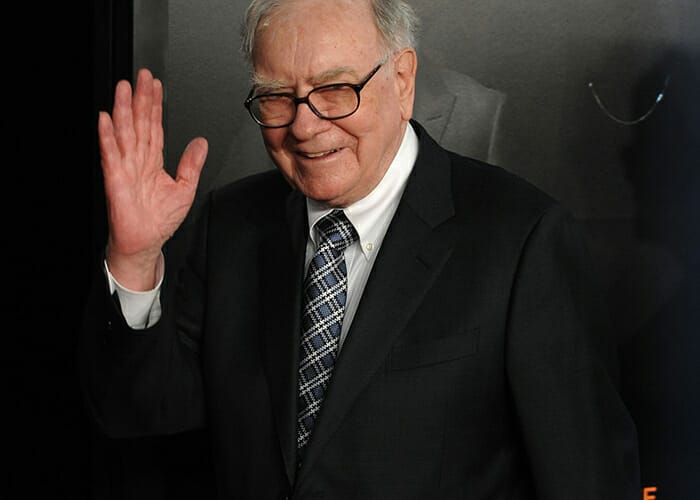Avoid derivatives, diversify, hire good managers and don’t reward just profit. These were Warren Buffett’s key investment tips for his 40,000 shareholders packed into Omaha’s CenturyLink Centre and the devoted hoard of global followers, tapping into the Berkshire AGM online in an inaugural livestreaming of the event – also broadcast in Mandarin.
Speaking alongside his business partner Charlie Munger, 92, who peered through thick glasses with the same combination of hard-headed capitalism and humour as the Berkshire chairman, it was the investment fees paid by endowments and pension funds to consultants and managers that most riled him.
Back in 2008 in a charity bet “he hopes is an example,” Buffett invested $1 million in a low cost index tracker, wagering his investment would fare better than the same investment in five hedge funds.
Eight years and several hundred hedge funds later, the S&P 500 index fund is beating a portfolio of funds assembled by hedge fund manager Protégé Partners, by 44 percentage points.
“That’s a terrible result for hedge funds but not for their managers,” he observed, in reference to the two and twenty fee structure paid to hedge fund managers – comprising a fee of two per cent of the assets they manage and 20 per cent of all gains.
“The net result of hiring professional management is a huge minus,” he said, adding: “no consultant in the world is going to tell you, ‘Just buy an S&P index fund and sit for the next 50 years’. You don’t get to be a consultant that way, and you certainly don’t get an annual fee that way. Far more money is made by people in Wall Street through salesmanship than investment abilities. That’s my message.”
Good managers ‘feel about Berkshire how we feel’
Buffett also eulogised about the importance of good managers in a business. Berkshire relies on its managers to run its 80-odd subsidiary companies. Independent of Buffett, they are the people who produce the money for him to invest and his ability to spot managerial talent has been crucial to his success.
“Outstanding managers are invaluable. We want to align ourselves with them and have them feel about Berkshire how we feel about it,” he said. Their strategy for finding the best is to look for patterns in evaluating humans, and businesses; beware that “very smart people” can do “really stupid things” risking what’s “important to them” for something that’s not; avoid “self-destructive behaviour,” and choose people with patience and opportunism.
Amazon founder Jeff Bezos was singled out for glowing praise in an endorsement that included Buffett’s insight into the impact of the internet on traditional business models.
He said the “Amazon effect” – whereby online shopping and quick delivery are now the norm – is a huge economic trend that wasn’t on the radar 20 years ago and the ramifications of which are just as difficult to predict going forward.
“If I owned a bunch of shopping malls, I would be thinking plenty hard about what they might look like 10 or 20 years from now,” he said.
IBM-aside, Buffett has tended to avoid investing in the technology sector, preferring to own stock in companies whose business he better understands.
His advice in a fast changing world? Hold onto a diversified portfolio of companies.
“We went into department stores but we didn’t think about ourselves as department store guys. We didn’t think of ourselves as steel guys or tyre guys, or anything of that sort. We’ve thought of ourselves as having capital to allocate.”
Derivatives still ‘Weapons of Mass Destruction’
And Buffett added that diversification’s best friend was long-termism. Defending his struggling allocation to American Express, and tougher climes elsewhere in the portfolio like Berkshire’s packaged goods companies, he said: “The world changes and we can’t make a portfolio change every time something is a little less advantageous than it used to be.”
A lot of “great companies” are weaker than they used to be at their peak, he said.
Buffett has beaten the derivatives drum before, once calling the financial instruments “weapons of mass destruction”.
This year he reiterated his warnings despite Berkshire’s own substantial derivative exposure. He expressed doubts at auditors’ ability to effectively police derivative use and “hold behaviour in check;” arguing that derivatives make it difficult to value companies, and that they exacerbate turmoil in a crisis when markets are shut, like after the 9/11 attacks.
“If there is a major discontinuity you will have a lot of problems. When you open back up you have large gaps in the positions.”
And the inevitability of another major attack is something very much on his mind.
“Being in the insurance business, you know someday somebody will pull off something that will be harmful,” he said, calling the likelihood of a cyber, nuclear, biological or chemical attack “one disadvantage to innovation.”
Buffett refused to predict where oil prices – or any other commodity values for that matter – were headed, but said declining oil prices should be good for the US overall as a net oil importer.
“It will ultimately benefit consumers,” he said, although it would be “very bad for some businesses,” particularly hurting capital values.
The duo gave a glimpse into the Berkshire culture where there are no regular meetings, or standard corporate speak.
“We don’t have any committees. We might go to a baseball game together. I’ve seen the other type of operation and I like ours better,” he said.
He also explained Berkshire’s remuneration system which rewards profits alongside growing the business.
“I don’t want people to be worried about the profit that might be impaired by growing the business,” he said.
Buffett has come out in favour of Clinton in the US Presidential race, but he didn’t think America’s next President would dramatically impact Berkshire Hathaway in a pragmatism that encapsulated his overarching message of business as usual for 2016.
“The system works well. It will keep working. No presidential candidate or president will end this.”



